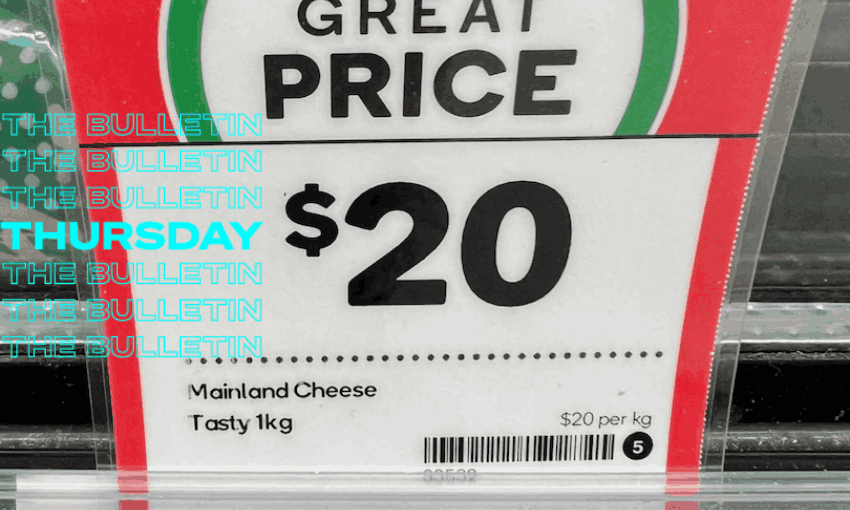Wholesale access, wholesale change?
The government has installed the threat of a regulatory backstop if supermarkets don’t open up access to their wholesale arms but once again, people just want to know when food might cost less
In today’s edition: direct link between state care and prison; Mallard signs off, Rurawhe elected; help requested in finding families of rugby referees; but first, we are once again asking about the price of cheese.
Mainland Tasty at it’s neverchanging price
Regulatory backstop not a silver bullet
Yesterday the government confirmed they will force the supermarkets to open up wholesale access to rivals. At this stage they’re hoping the main players will do that of their own accord but they have a year, and then a new grocery commissioner will have the power to impose further regulation to “force fairer prices”. Stuff’s Melanie Carroll has an explainer on the changes and what they might mean for shoppers. BusinessDesk’s Pattrick Smellie (paywalled) writes about what he says is the only new news from yesterday’s announcement, the enablement of small-scale suppliers of food and other groceries to collectively negotiate with New Zealand’s two dominant supermarket suppliers. Smellie writes that “ironically, the collective bargaining carve-out arrangement could increase prices on the supermarket shelves.”
Cost of groceries “completely out of control”
Stuff has launched a tracker this morning charting the cost of a basic shop each month at Countdown, Pak’n Save and New World. Bodo Lang, head of marketing at Auckland University’s business school, said the cost of housing and groceries was “completely out of control”. He also says it’s impossible for shoppers to do a perfect job finding the best product at the best value for money. You could cut items, like cheese, he said but “we’re a civilised society” and cheese isn’t exactly caviar. As is now customary when discussing food prices, The Spinoff’s cheese index tells us that Mainland Tasty has been stubbornly stuck at $20 a block for exactly two months today.
Not just about supermarket competition
Farmers have recently warned that food prices will climb as their costs climb. Rising feed, fertiliser and fuel costs are to blame, exacerbated by supply chain issues and the war in Ukraine. Rabobank's Emma Higgins says that although the longer term outlook was good, we have a bumpy ride ahead in the short term. Though we can’t eat it, a toilet paper shortage looms after Kawerau’s Essity mill locked workers out on August 9 as a pay dispute drags on. I was listening to RNZ’s Checkpoint last night to hear the alarming news that we don’t actually know how much toilet paper we have left in the country.
Time for a system rethink?
In the UK, where they’re facing a food “austerity” crisis, there are calls to rethink the entire food system. Europe is also experiencing the worst drought in 500 years which will have flow on effects. The New Statesman has just published a piece calling for radical change in the UK. New Zealand produces enough food for 40 million people and there were calls last year to “feed the five million first” that seem to have taken a backseat to the present day reasons for the high cost of food like supply chain issues, a lack of competition and inflation. RNZ ran a series on food last year, including this great example of data journalism from Farah Hancock which illustrates where the food for 40 million actually goes. If food production in New Zealand was the equivalent of ten sheep meat meatballs, New Zealanders get half of one meatball.
Get out of your winter funk with Here magazine
Here is an architecture and design magazine which appreciates luxury and humility in equal measure. Covering homes as well as books, art and design, Here wants to inspire you to notice the things that bring joy to your space.Now, they’re offering The Spinoff readers seven issues for the price of six. Subscribe using the code SPINOFF22 and get the latest issue, Happy Days, delivered to you – a perfectly beautiful balm for your late-winter blues. (Sponsored)
Mallard, out.
Te Tai Hauāuru MP Adrian Rurawhe was elected as Parliament's new Speaker yesterday as Trevor Mallard officially stepped down. Rurawhe is only the second Māori to be elected to the role and got straight into the job by issuing a warning to new independent MP Gaurav Sharma who spoke briefly. Stewart Sowman-Lund details that very awkward exchange in the House. There are a range of reviews rolling in of Mallard’s performance as Speaker and punts of his likely performance in his new role as our man in Ireland. John MacDonald gives him a 2/10 as Speaker and Luke Malpass reckons he’ll be a good ambassador. If you’d just like a short highlights package of Mallard's career, RNZ has you covered.
Report confirms what we already knew about the link between care and incarceration
A report tabled at the Abuse in Care Royal Commission of Inquiry yesterday shows one in three young people placed in residential care by the state between 1950 and 1999 went on to serve a prison sentence. This report was billed as shocking and startling, and what it says is, but it’s not entirely new information. In 2015, then-chief youth court judge Andrew Becroft determined there was a "staggering and profoundly concerning link" between children who have been in care and crime. Back in 2019, youth justice advocacy group JustSpeak issued a statement where Khylee Quince pointed out then that “70% of our prison population has a care and protection background” and “children in care are 107 times more likely to be imprisoned by age 20 than other children.” Always good to have another evidentiary log thrown on this horrendous fire, I guess.
The Spinoff Members is a community dedicated to supporting our work. You've heard from a few of our members this month on what inspired them to join.
Whatever it is about The Spinoff that you value most, know that every dollar donated will go towards making that happen and ensuring The Spinoff remains free to all. Join now.
Thanks to Jodi, Ian, Ben and Aaron for their kind words and to all our members for their continued support – we wouldn’t be here without you.
Click and collect
First preventative drug for Covid available for most at risk in New Zealand.
Only five Auckland stores have received security updates so far to prevent against ram raids.
More homes red-stickered in Nelson.
No more Tupperware parties as the brand pulls out of New Zealand.
State controlled power companies more than double their profit.
Got some feedback about The Bulletin, or anything in the news? Get in touch with me at thebulletin@thespinoff.co.nz.
If you liked what you read today, share The Bulletin with friends, family and colleagues.
In April, The Spinoff published an investigation into music teacher David Adlam’s relationship with his 16-year-old student in 2004. Today, another former student of his from more than three decades earlier shares her own traumatic experience with Alex Casey.
Te Kuru o te Marama Dewes writes about the vital importance of kapa haka – and why that's not reflected in the funding it receives. Toby Manhire and Reweti Kohere report from the political donations trial underway at the Auckland High Court. The new Manti Te'o documentary on Netflix reminds Sela Jane Hopgood why she wanted to become a journalist. Shanti Mathias goes to a Cricut demonstration and wonders what the urge to customise our objects says about us. The Spinoff's leading chip experts Mad Chapman and Calum Henderson conduct high-level analysis of each Celebrity Treasure Island star’s favourite chip.
Recognition for referees
New Zealand’s test-level rugby referees are to be recognised at a special capping ceremony in September. New Zealand Rugby are calling for help in finding the families of referees who have died to represent their loved ones at the function. It’s an idea that was floated seven years ago but didn’t get traction. England, Ireland, Wales and Australia have all undertaken similar initiatives to recognise those with one of the hardest jobs on the field.










